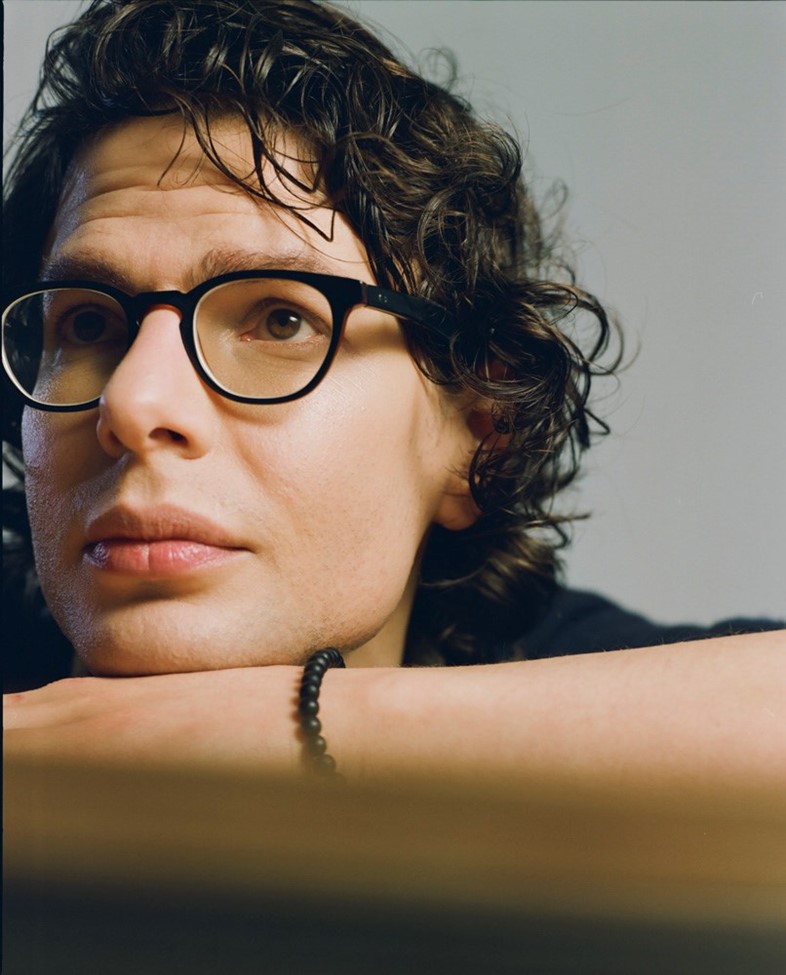“I was interested in figuring out what was wrong with me in my twenties,” says the comedian and director of his new film Benjamin
- TextNick Levine
Simon Amstell’s new film Benjamin is a rom-com about a relationship that blossoms, falteringly, between two people at opposite ends of the ‘comfortable in their own skin’ spectrum: Colin Morgan’s Benjamin is a painfully self-conscious and sometimes clueless London filmmaker; Phénix Brossard Noah’s is a sweetly self-possessed French musician.
If you’re familiar with Amstell’s previous work, from his poignant and self-deprecating sitcom Grandma's House (which unlike Benjamin, he also starred in) to his dazzlingly savage interviews on Popworld, it’s impossible not to presume Benjamin is a version of himself. Early in the film, Morgan’s character turns something as simple as making porridge for Noah into a wince-inducing symphony of cringes. When I meet Amstell to chat about the film, he makes no attempt to distance himself from the film’s anxious hero.
“I think he’s definitely me in my twenties, before I got better,” says Amstell, who’ll turn 40 in November. “There’s still elements of him in me. I was very keen on Colin Morgan using his own [Irish] accent in the film as a way of bringing himself to the character. I wasn’t interested in someone doing an impression of me. But I don’t think I could have written and directed this film when I was 25 or 28 or whatever. Because when I was writing it, I was going on the same journey as the character.”
Amstell says he started writing Benjamin “because I was interested in figuring out what was wrong with me in my twenties – [why] I couldn’t have any kind of healthy relationship with another human being. I started writing dialogue from various conversations I’d had with previous boyfriends and eventually came up with a story that would help me explore what I thought was probably wrong with me, and therefore the character.”

At the same time, Amstell is keen to make clear he didn’t just cut and paste highs and lows from his own dating history. “I’ve fictionalised the most... I almost want to say ‘worst’, but that feels a bit aggressive to my former self. I’ve fictionalised the most unhealthy parts of myself,” he explains.
He also explains how he feels as though “he’s written Benjamin out of me,” adding, “I’m not as nervous anymore”. During our interview, I think I see what he means: he’s intensely analytical and pokes fun at his own awkwardness in a familiar Amstell-ish way, but he’s also more relaxed than he seemed during his TV days.
So, looking back at his 20-something self, what does he think his problems were? “There’s a scene in the film that crystallises it,” he replies after a pause. “Noah asks to come back to Benjamin’s flat – obviously for sex. And Noah is about to kiss Benjamin, but Benjamin blocks the kiss by saying: ‘Do you want to see a bit of the film I’ve made?’ Because he can’t just be in the moment with another human being without feeling like he has to do something to deserve it. That’s what it was all about.”
“My problem,” Amstell continues, “was that all I knew how to do was perform and do a whole song and dance routine in order that people might like me. I was looking back at some old photos recently and couldn’t quite believe how pretty I was. Ha! It was really quite upsetting, because it wouldn’t have made any sense to me that I could have just walked into a room at 21 and that would have been enough. I was being so funny... and probably being quite annoying actually.”
Many of us will see elements of ourselves in Benjamin: the way he overthinks things and closes himself off emotionally are extreme, but very recognisable. When I ask what advice he’d give to someone who relates to the character – and therefore, Amstell’s former self – Amstell points out that he, unlike Benjamin, has benefited from having therapy. Amstell also recalls with a slight self-mocking laugh that he even travelled to Peru to visit a shamen and drink ayahuasca, a traditional spiritual medicine believed to have healing benefits.
Then he adds, thoughtfully: “I think there just comes a point that the defences you’ve built around you, rather than protecting you, are limiting you. And it’s difficult, I’m not a doctor, but I suppose what the film may encourage is a kind of letting go of fear around not being in control of every moment of your life. You know, Benjamin in the end surrenders his ego. All the things he thought were keeping him safe were actually causing him anxiety and depression, and in the end he lets them go and he takes a risk. So I suppose if people [who watch this film] just feel a little less fearful to let go of their idea of who they are and be more free, that would be quite cool.”
Benjamin is out in cinemas and online on March 15.











